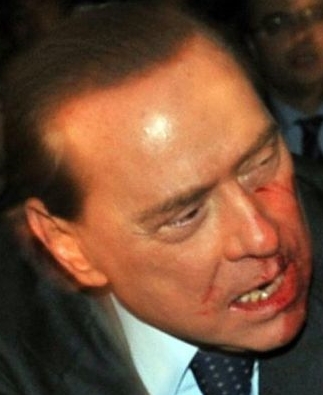
Be sure about one thing: in my very humble opinion it is not like Berlusconi would not deserve some kind of punishment, for the damage he has caused to my country. But violence is not the way.
Yesterday's attack to the Italian premier by a deranged person with mental problems would not deserve much commentary, were it not for what really brought the hand of the assailer up and forward. There is, indeed, a climate of hatred in Italy these days. But who is responsible for it ? And what can we expect next ?
Politicians are used to employ strong words to distinguish their at times minimally different position from those of their colleagues; and in a situation where real differences emerge, and institutional conflicts are exacerbated by a real democratic emergency, it is unavoidable that the pitch of their voices grow even further.
So who is responsible for this daily bombardment ? I am sorry for being very predictable, but I claim that Berlusconi himself is the main source. His imperative is today to save himself in the only few remaining trials which his troop of lawyers could not bring to fail with all the other means, after a string of sapiently machined expiration of time limits of the trials, exceptions, challenges of judges, laws forced through the parliament which depenalized the alleged offences, and a few trials which ended nowhere because of lack of concrete proofs. And Berlusconi is very worried, because the only way to avert a sure conviction in a crystal-clear case of corruption is to force yet another ad-personam law through the two parliament chambers, despite a similar law has just been canceled by the Italian Constitutional Court.
The clash of powers is nerve-wrecking for everybody. By trying to steer the political agenda to suit his own needs, the Italian premier has already totally alienated his second-best ally, Gianfranco Fini. Fini sits at the presidency of the Camera dei Deputati (the Italian lower chamber), and despite his own love for power, he seems unwilling to continue to play the puppet as the rest of the government members keep doing regardless of the amount of contortions of the threads above their heads. And despite attempts at calming down matters, Italy's President of the Republic Giorgio Napolitano is himself under heavy attack from Berlusconi. The premier has understood that a preventive war aimed at undermining the legitimacy of Napolitano is the only way to win the political battle.
The reason is simple: Berlusconi needs to justify his forceful passing of a disrupting law that will cancel 20 to 30 percent of ongoing trials -including his own, ca va sans dire- in front of his electors; and the law would not be signed by the President of the Republic in a normal situation, because of its evident flaws. Hence the preventive attack to Napolitano, to the "party of the judges", to magistrates and to the opposition. No day passes without the Italian premier expressing his lamentations of being a victim in a country where communists have expressed the last three presidents, control magistrates, and conspire against him. It feels particularly strange to hear Berlusconi call "communist" Carlo Azeglio Ciampi, whom he implored for a second mandate no later than a few years ago -as we were reminded by the same former President Ciampi a few days ago.
In such a situation, it is by no means strange to see a deranged individual raise his arm against the engine of this political instability. Shortly after the incident Berlusconi himself declared he had been almost waiting for it; and he might have been sincere, for once. The wind he has seeded is becoming a tempest. In Italy we have seen organized terrorism in the seventies and eighties flourish in a situation of political tensions, and we know that it does not take long for such spectres to materialize again. It is a spiral of anger and violence we know all too well.
I believe such a turn of events has not yet happened, and I want to trust that there still is time to avoid it. The assault of yesterday night was a solitary action. I fear it might not take long, though, to witness the development of more serious, organized attacks, especially if there is no release in the political tension. And I wonder whether there is indeed some obscure, hidden force directing Italy toward a new authoritarianism. Such a plan has been attempted in the past -and it partly succeeded; but the same people who tried it then are still around. They are professionals at creating a situation, the so-called strategia della tensione (stress strategy) where citizens feel insecure and accept limits to their freedom in exchange for "safety".
Italian democracy is maybe as much at risk today as it has been in the seventies. We should stop thinking those dark times are behind us: it may happen again. I hope everybody takes a step back tomorrow. A proposal by Berlusconi's government to discuss with the opposition in the parliament the proposed changes to the judiciary system, instead than announcing that the law will be forced through, would be such a step.





Comments